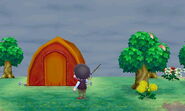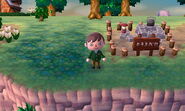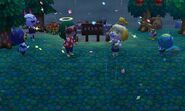m (why did this article have two infoboxes) |
No edit summary Tag: Visual edit |
||
| Line 7: | Line 7: | ||
|service = Villager Accommodation |
|service = Villager Accommodation |
||
|hours = All day}} |
|hours = All day}} |
||
| − | The '''campsite''' is a [[Public Works Project]] in {{NL}}. Only one may be constructed, and it may not be demolished after it's created. It requires a 5 by 5 clearance space when being constructed, and stands in addition to the ten villager lots in the player's town. |
+ | The '''campsite''' is a [[Public Works Project]] in {{NL}}. Only one may be constructed, and it may not be demolished after it's created. It requires a 5 by 5 clearance space when being constructed, and stands in addition to the ten villager lots in the [[player]]'s [[town]]. |
When occupied, it takes on the appearance of a tent during the [[Spring|spring]], [[Summer|summer]], and [[Autumn|autumn]]; it appears as an [[Igloo|igloo]] during the [[Winter|winter]]. A random, non-resident [[villager]] will occasionally set up the appropriate fixture at the campsite. The player may then play games with the villager not unlike the ones played with [[Summer Campers]]. After extended conversation, the player may be given the opportunity to convince the villager to move into their town through a game of rock-paper-scissors or charades. Usually, if a neighbor moves out, a camper of the same nature will appear in the campsite several days later; this may happen to help balance the town's residents. |
When occupied, it takes on the appearance of a tent during the [[Spring|spring]], [[Summer|summer]], and [[Autumn|autumn]]; it appears as an [[Igloo|igloo]] during the [[Winter|winter]]. A random, non-resident [[villager]] will occasionally set up the appropriate fixture at the campsite. The player may then play games with the villager not unlike the ones played with [[Summer Campers]]. After extended conversation, the player may be given the opportunity to convince the villager to move into their town through a game of rock-paper-scissors or charades. Usually, if a neighbor moves out, a camper of the same nature will appear in the campsite several days later; this may happen to help balance the town's residents. |
||
Revision as of 08:11, 22 December 2014
The campsite is a Public Works Project in New Leaf. Only one may be constructed, and it may not be demolished after it's created. It requires a 5 by 5 clearance space when being constructed, and stands in addition to the ten villager lots in the player's town.
When occupied, it takes on the appearance of a tent during the spring, summer, and autumn; it appears as an igloo during the winter. A random, non-resident villager will occasionally set up the appropriate fixture at the campsite. The player may then play games with the villager not unlike the ones played with Summer Campers. After extended conversation, the player may be given the opportunity to convince the villager to move into their town through a game of rock-paper-scissors or charades. Usually, if a neighbor moves out, a camper of the same nature will appear in the campsite several days later; this may happen to help balance the town's residents.
Effect of the Campsite on the Town
Having a campsite in the player's town does not affect any villagers but the player themself. Villagers will not take notice of the campsite nor will they remark if anybody is currently camping, however Booker or Copper will notice.
The campsite can be used as a buffer with which the player can control which villagers are and are not added to the town. If a town has less than 9 out the 10 possible villagers, new construction will take place within 2 days of the last move. This will cause the town to receive a random villager, and it may be a villager that the player does not care for personally.
If a town has exactly 9 villagers and a campsite, there will not be any unwarranted arrivals in the player's town. Only campers who have been invited to live in the player's town will be able to move in, so by keeping 9 Villagers in a town the player has some control over which villagers would become the 10th villager present in their town. It should be noted, however, that there is still the possibility of obtaining a villager from someone the player has streetpassed instead.
Minigames
The minigames the villagers offer vary in title depending on the personality of the Villager, but the three minigames that each villager offers are fundamentally alike. Participation in the games is not mandatory: the player can decline playing the minigame. The villager will not offer to play a minigame if the player has a full inventory or less than 5,000 Bells. Feng Shui seems to have an affect on the minigames. Yellow Feng Shui seems to raise the price of both buying and selling items, and Green or Red Feng Shui affects the game's outcomes. With a low Feng Shui, the games are often in the Villager's favor. With a high Feng Shui, the games are much more even. All percentages on this page are assuming odds are fair.
5 Item Minigame
Also known as:
- Turbo <Villager Name>'s Fun Furniture Free-for-All by Snooty villagers
- Cost-a-Lot by Normal villagers
- Five-Chance Furniture Frenzy by Lazy villagers
- Tough Chances by Cranky villagers
- Snap Decision by Peppy villagers
- Five Chances by Jock villagers
All variations of this minigame function identically. The villager will explain the rules after the player has agreed to play. The villager informs the player of an item and its randomly assigned price. The player can either purchase the item or pass. Each time the player passes, the villager will offer another item with another randomly assigned price. If the player passes on the fourth item, they are forced to buy the fifth one.
Single Item Minigame
Also known as:
- Find the Queen by Snooty villagers
- Guess What I Ate by Lazy villagers
- High Card, Low Card by Cranky villagers
The player is informed of the item that the villager owns before they agree to the game. Once the player agrees to play, they can choose to hear the rules or not, after which the villager sells the item to the player for a decided price. The price is decided via a variation of methods:
4 Card Method
The villager has four cards, each with a different price number on them. The player chooses a card and the Villager reads out the price.
3 Card Method
The three card method is used in "Find the Queen". The villager has three cards, one of which is the "correct" card. The player is required to guess which card is the "correct" card. This game includes three rounds, after which the amount of successes affects the price at which the item is sold for. If the player guesses correctly all three times, they get the item for free.
Odds and Prices
0 Successes: 29.6% - 5,000 Bells (Assuming perfect Yellow Feng Shui)
1 Success: 44.4%
2 Successes: 22.2% - 500 to 1,000 Bells
3 Successes: 3.7% - Free
2 Card Method
This is the method used in Guess What I Ate and High Card, Low Card. The villager gives the player two options. If the player picks the correct option, the price of the item being sold comes down. This process is repeated three times.
Closest Number method
This method is used in the game Price Fixer, in which the camper thinks of a number between 1 and 8. The player must guess what number the villager is thinking of. The closer the number, the cheaper the item.
Selling Item Minigame
Also known as:
- Chase the Ace by Snooty Villagers
- Exciting (villager name) Chance Game by Smug Villagers
The villager randomly selects an item from the player's inventory and asks the player to sell it to them. If the player agrees, they will play a minigame to decide the selling price. The player may choose to hear the rules or not.
Elimination Method
The villager gives the player two options. If the player picks the right one, they proceed, but if they pick the wrong one, they fail. If the player proceeds through all three rounds, the villager sells the player the item
Odds and Prices
0 Successes: 50% - 100 to 500 Bells (10 to 50 if the item is cheap)
1 Success: 25% - 500 to 1,000 Bells (50 to 100 if the item is cheap)
2 Successes: 12.5% - Between 1 and 3 times the item's purchase price (purchase price is generally 4 times the sell price) depending on the item (cheap items will have their price multiplied more)
3 Successes: 12.5% - Between 1 and 5 times the item's purchase price.
Out of Three Method
This is a more forgiving variation of the elimination method. The player is not eliminated if they fail, and plays through all three rounds. The total successes is counted up at the end of the game and affects the end price of the item.
Odds and Prices
0 Successes: 12.5%
1 Successes: 37.5%
2 Successes: 37.5%
3 Successes: 12.5%
The pricing of the items is identical to the Elimination Method
Exclusive Items from Campsite
The player can receive exclusive items from the Campers in the Campsite at their town.
- Backpack
- Bonfire
- Kayak
- Sleeping Bag
- Surfboard
- Propane Stove
- Campfire Cookware
The following can only be obtained from a Camper in an Igloo.
- Stewpot
- Campfire
- Camp Stove
- Fish Grill
- Smoker





